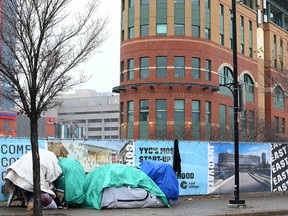Authors say relationship between mental health disorders and homelessness is symbiotic

Article content
More than two-thirds of homeless people suffer from a mental health disorder, according to a new study by researchers at the University of Calgary.
The study, published in the American Medical Association, reviewed 85 studies conducted between 1980 and 2021, analyzed cases of homelessness and found a strong link between homelessness and mental health disorders in countries such as the United States, Canada and Germany. .
Advertisement 2
Article content
Article content
Most of these people have personality and substance use disorders, while more than a quarter suffer from serious mental illnesses such as schizophrenia, psychotic disorder and bipolar disorder, more than eight times more than the general population.
The authors say the relationship between mental health disorders and homelessness is symbiotic: People’s addiction leads them down a path to losing housing. Or, when people can no longer afford housing, they begin using drugs to alleviate the trauma of being homeless and may develop antisocial personality disorder as a reaction to their situation.
The researchers found that the combined presence of the two problems is increasing, but they couldn’t definitively say whether that’s because the problem is getting worse or because institutions are better at detecting them.
“Most people understand that there is some type of relationship between mental health problems and homelessness for some people, although it is really difficult to understand the extent to which mental health conditions are present in homeless people,” said the lead author. of the report said Dr. Dallas Seitz.
Article content
Advertisement 3
Article content
But Seitz, a psychiatrist and professor at the University of Calgary, is no stranger to the problems faced by homeless people. He sees the problem on the streets of Bridgeland where he lives, but he also encounters homeless people in his practice at Foothills Medical Center and Rockyview Hospital.
“It’s hard to watch,” he said. “It’s really hard to ignore that when you see it in your community.”
Recommended by Editorial
-

Province-led homeless navigation and support center in the works for Calgary: Nixon
-

Aiming to help youth at risk of homelessness, Trellis Society expands its housing program
-

Federal report calls encampment expansion a human rights crisis as homelessness rises in Calgary
-

‘A place with dignity’: Calgary’s first Indigenous warming center opens its doors
Calgary Homeless Foundation has housing and outreach programs to provide support
One of the challenges of the report is defining homelessness. Many homeless people experience what is called hidden homelessness, where they are temporarily housed with the help of friends and family, but are not counted in official statistics.
Advertisement 4
Article content
A count carried out on a specific day in 2022 estimated that 2,782 people were homeless. As of April 17, 2,257 individuals and families are on the “coordinated access and assessment list,” which is the system the Calgary Homeless Foundation uses to connect homeless people with appropriate supports.

More than 70 per cent have a self-reported mental health problem, while more than 44 per cent experience trimorbidity (a combination of substance use disorders and physical and psychological health problems), according to the Calgary Homeless Foundation.
The organization also hosts various housing and outreach programs for a wide range of people, including youth, adults and families.
“These supports may include future counseling sessions, other community supports, or referrals to brief or long-term counseling with mental health counselors at our partner agency, CUPS,” CHF said in an emailed statement.
“All program models are designed as recovery-oriented supportive housing programs for people experiencing homelessness. “We understand that recovery is a complex, non-linear process for each individual and family, and it can be difficult for homeless people to address their mental health needs when they are homeless.”
Advertisement 5
Article content
Advocate points out barriers to health care and cycle of homelessness
However, advocates have said barriers to health care remain. Many homeless people and people with substance use disorders are turned away from hospitals, says Chaz Smith, CEO and founder of BeTheChangeYYC, a homeless advocacy group.
“When you don’t have a family doctor and you don’t have access to a house, a shower or laundry, it’s difficult to wait six hours in a hospital. I have heard many people express that they feel discriminated against because of their appearance or their smell.”

Many have stopped trusting hospitals altogether, and Smith believes sending outreach teams to the homeless is a better way to address the problem. When it comes to treating their substance use disorders, many have to undergo a detox process in which they abstain from using substances for a few weeks.
Smith said people have to wait long periods before they can be admitted to these processes and, once completed, have to wait again for treatment. “So the fundamental question is: Is it okay for someone to detox, go to treatment, and then be discharged as homeless again?” Smith said.
The authors conclude their report by recommending “housing first” strategies, among several health initiatives, so that homeless people receive a home when they are admitted to treatment.
Article content




